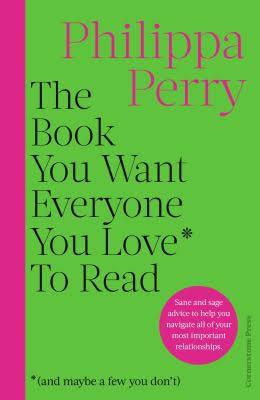I am lucky enough to count Philippa Perry as a good friend, so I went to talk to her about her new book, The Book You Want Everyone You Love* To Read (*and maybe a few you don’t).
You may know Philippa as the agony aunt from The Observer, or you may know her previous work, The Book You Wish Your Parents Had Read, which was phenomenally successful, or you may know her from her numerous TV appearances.
I know her as Phil.
We can both talk the hind legs off a donkey, so here is an edited version of our conversation.
SM So, were you really surprised at the success of your last book?
PP It’s arrogant to say so, but I knew it was a good book. I knew it was saying things that hadn't been stated quite as clearly before and that I was passionate about the message in it, so I could really get behind it and push it. I'm very, very pleased that, worldwide, I’ve sold 2 million copies!
SM What do you think it was that hit?
PP I think it's because, when you are told something you've always known but you've never put into words before, it really lands. People really know that what children need is a good, honest relationship where they feel safe with their parents.
SM I think it’s because you let go of judgement.
PP Yes, I think that's very important. Everybody's doing their best with what they've been brought up with and what they've been given and what culture they're from…
SM Tell me about good and bad mothers.
PP The labels irritate the pants off me because neither helps children in any way. ‘I'm a good mother’ is defensive, not admitting the impact you may have had on your children, however good your intentions were. And ‘I'm a bad mother’ people just give up as though there's nothing they can do about it. So, both those labels are appalling.
I actually had it read by sensitivity readers, looking out for that, because even though consciously I don't want to judge, unconsciously I might. And I did have to make one or two alterations. I really don't want to judge, because it's so unhelpful. A judgement is a full stop. If you've got a judgement, there's no room for exploration.
I'm not saying we shouldn't say, ‘I think I made a mistake then’ and to rectify that mistake. We all make mistakes all the time.
SM God, I mean we could extend that out to much more than just personal relationships right now – social media, politics.
PP Oh, the entire time. It's very unhelpful, but it's quite addictive, isn't it? It's satisfying to say, ‘Yeah, Matt Hancock, what a twat!’ Rather than to wonder why he is on Celebrity SAS…?
SM My favourite programme!
PP If we want to judge, let's just do it recreationally, watching celebrities. That's good telly!
SM I feel we’re currently bombarded by advice on everything. So what is it about your advice that lands?
PP I want people to look at their dilemmas from different angles and see that their problem might not be what they think it is, it might be something else entirely. I just start by giving them another view rather than close things down.
I don’t want to pin the butterfly on the board. I want to open it up and see where it flies to.
Dr Perry.
SM In this new book you talk about mistakes, including your own. And you also say, a couple of times, that being right isn't everything. That's pretty counter to what's going on in the culture at the moment. But I think that’s really important.
PP I think that's probably one of the main problems I get sent into my agony column. You know: ‘My husband is wrong, how can I make him see?’ And then my solution is, ‘Okay, let's just pretend to be your husband for a bit. What does it feel like to have his cultural background and his baggage? How does it feel then?
‘How about, instead of so tenaciously holding on to your position, you fly above and have a look at all the actors in this argument, imagine what everybody's fears are? What is your mother-in-law frightened of? And then how does that help? Does that soften your position a bit so you can move closer to a compromise?’
Being right keeps you rigid. Always.
SM One of the things your last book taught me was about ways of arguing and Fact Tennis, which is a thing I play and always want to win.
PP Being right is overrated. It's about thinking that if there is some doubt you might be annihilated. We confuse being right with being alive.
A lot of people reply to my columns and tell me I am wrong…
Keep reading with a 7-day free trial
Subscribe to Letters from Suzanne to keep reading this post and get 7 days of free access to the full post archives.





